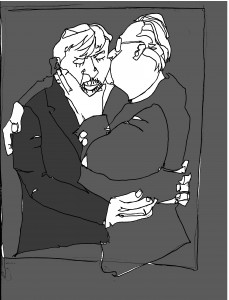The Hug Treatment

Political gestures such as these are resonant with meaning—though not for the reasons conservatives suggest. Through hugs, handshakes, and kisses, politicians communicate, perform, and stage themselves. In international political settings, where leaders represent national identities, cultural differences often come to the fore. In some cultures, a kiss or a hug is appropriate for any social encounter, while in others a handshake is the appropriate way of showing respect. In other words, political gestures matter.
As sociologist Mabel Berezin pointed out in a 2002 book chapter, “Secure States: Towards a Political Sociology of Emotion,” politicians display emotions to construct a “community of feelings.” They perform in certain ways in order to intensify emotional identification and gain membership in an international community.
But context is key, according to sociologist Judith Bessant, writing in the Journal of Sociology in 2008. To understand the meaning of Obama-Erdogan hug, one must know that politicians attending the meeting in question were discussing the Eurozone debt crisis and capital flow regulations, and that Turkey is becoming an important regional actor with an export-oriented economy. The hug may indicate that the United States and Turkey are becoming (or that Obama hopes they will become) more closely aligned.
Giving the hug treatment can sometimes backfire, as it did for New Jersey Governor Chris Christie. After publicly embracing President Obama during the clean-up after Hurricane Sandy, Christie, generally seen as one of the Republican Party’s top prospects for the White House in 2016, was swiftly snubbed by conservatives.
